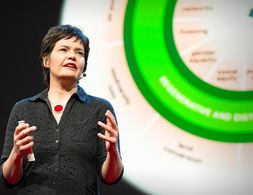✕
57 results
This course provides a simple introduction to problems that social scientists are working on (e.g. racial disparities, inequality and climate change) in a manner that does not require any prior background in Economics or Statistics.
The Great Recession 2.0 is unfolding before our very eyes. It is still in its early phase. But dynamics have been set in motion that are not easily stopped, or even slowed. If the virus effect were resolved by early summer—as some politicians wishfully believe—the economic dynamics set in motion would still continue. The US and global economies have been seriously ‘wounded’ and will not recover easily or soon. Those who believe it will be a ‘V-shape’ recovery are deluding themselves. Economists among them should know better but are among the most confused. They only need to look at historical parallels to convince themselves otherwise.
How do people make decisions? There is a class of models in psychology which seek to answer this question but have received scant attention in economics despite some clear empirical successes. In a previous post I discussed one of these, Decision by Sampling, and this post will look at another: the so-called Fast and Frugal heuristics pioneered by the German psychologist Gerd Gigerenzer. Here the individual seeks out sufficient information to make a reasonable decision. They are ‘fast’ because they do not require massive computational effort to make a decision so can be done in seconds, and they are ‘frugal’ because they use as little information as possible to make the decision effectively.
Health Economics traditionally involves two distinct strands. One focuses on the application of core neoclassical economic theories of the firm, the consumer and the market to health-seeking behaviour and other health issues. It suggests a role for government intervention only in the case of specific market failures (for example externalities, asymmetric information, moral hazard, and public goods) that distort market outcomes. The second strand is evaluation techniques, used to assess the cost effectiveness of competing health interventions.
What influence do changes in tax policy or state decisions on expenditure have on economic growth? For decades, this question has been controversially debated.
The outbreak of COVID-19 has substantially accelerated the digitalization of the economy. Yet, this unprecedented growth of digital technology brought novel challenges to the labour market. Rise in income inequalities and precarious working conditions or polarization of jobs. In this essay, we try to assess what tools to use to counter these trends.
This workshop offers an introduction to Degrowth and Ecological Economics. It starts by surveying the socio-ecological crisis and its pseudo-solutions, and then moves to Ecological Macroeconomics as a relatively recent field of scholarship within Ecological Economics.
This course describes Bayesian statistics in which one s inferences about parameters or hypotheses are updated as evidence accumulates You will learn to use Bayes rule to transform prior probabilities into posterior probabilities and be introduced to the underlying theory and perspective of the Bayesian paradigm The course will apply …
Deforestation is estimated to be responsible for about 12-29% of global greenhouse gas emissions. This essay will explore ecological economics as an alternative lens through which to approach forest conservation and the acceleration of climate change.
Approaching the law of nature that determines all forms of economy. The bulk of economic theory addresses the economic process by setting out on a catalogue of aspects, seeking the laws in the aspects and hoping to get together a reliable view of the whole.
The notion that the demand and supply side are independent is a key feature of textbook undergraduate economics and of modern macroeconomic models. Economic output is thought to be constrained by the productive capabilities of the economy - the ‘supply-side' - through technology, demographics and capital investment. In the short run a boost in demand may increase GDP and employment due to frictions such as sticky wages, but over the long-term successive rises in demand without corresponding improvements on the supply side can only create inflation as the economy reaches capacity. In this post I will explore the alternative idea of demand-led growth, where an increase in demand can translate into long-run supply side gains. This theory is most commonly associated with post-Keynesian economics, though it has been increasingly recognised in the mainstream literature.
Firms are the primary places where economic activity takes place in modern capitalist economies: they are where most stuff is produced; where many of us spend 40 hours a week; and where big decisions are made about how to allocate resources. Establishing how they work is hugely important because it helps us to understand patterns of production and consumption, including how firms will react to changes in economic conditions and policy. And a well-established literature – led by post-Keynesians and institutionalists – holds that the best way to determine how firms work is to…wait for it...ask firms how they work. This a clearly sensible proposition that is contested in economics for some reason, but we’ll ignore the controversy here and just explore the theory that springs from this approach.
In both economics textbooks and public perceptions central banks are a fact of life. On the wall of my A-level economics classroom there was the Will Rogers quote “there have been three great inventions since the beginning of time: fire, the wheel, and central banking”, summarising how many economists view the institution. There is a widespread belief that there is something different about money which calls for a central authority to manage its operation, a view shared even by staunch free marketeers such as Milton Friedman. This belief is not without justification, since money underpins every transaction in a way that apples do not, but we should always be careful not to take existing institutions for granted and central banking is no exception. In this post I will look at the idea of private or free banking, where banks compete (and cooperate) to issue their own currency.
In the history of the social sciences, few individuals have exerted as much influence as has Jeremy Bentham. His attempt to become “the Newton of morals” has left a marked impression upon the methodology and form of analysis that social sciences like economics and political science have chosen as modus operandi.
From the two premises that (1) economies are complex systems and (2) the accumulation of knowledge about reality is desirable, I derive the conclusion that pluralism with regard to economic research programs is a more viable position to hold than monism. To substantiate this claim an epistemological framework of how scholars study their objects of inquiry and relate their models to reality is discussed. Furthermore, it is argued that given the current institutions of our scientific system, economics self-organizes towards a state of scientific unity. Since such a state is epistemologically inferior to a state of plurality, critical intervention is desirable.
This paper starts with an evaluation of three common arguments against pluralism in economics: (1) the claim that economics is already pluralist, (2) the argument that if there was the need for greater plurality, it would emerge on its own, and (3) the assertion that pluralism means ‘anything goes’ and is thus unscientific. Pluralist responses to all three arguments are summarized. The third argument is identified to relate to a greater challenge for pluralism: an epistemological trade-off between diversity and consensus that suggests moving from a discussion about ‘pros’ and ‘cons’ towards a discussion about the adequate degree of plurality. We instantiate the trade-off by showing how it originates from two main challenges: the need to derive adequate quality criteria for a pluralist economics, and the necessity to propose strategies that ensure the communication across different research programs. The paper concludes with some strategies to meet these challenges.
How did the coronavirus almost bring down the Global Financial System? What effects does monetary policy have on inequality? What role do Central Banks have in the social-ecological transformation? How could Central Banks tackle climate change? What is Central Bank Digital Currency?
This course provides future change makers in public and private sectors with a comprehensive overview on the structures and actors that shape markets.
Austrian economics focuses on the economic coordination of individuals in a market economy. Austrian economics emphasises individualism, subjectivism, laissez-faire politics, uncertainty and the role of the entrepreneur, amongst others.
Aim of this intensive workshop is to understand macroeconomic workings of climate change as as the background of sustainable finance; to analyse financial assets with ESG (Environmental, Social and Governance) criteria attached to them and their markets and important institutional players; to develop a critical perspective on the current setup of sustainable finance; and to synthesise this knowledge by applying it on in-depth case studies.
After completing the module, participants should be able to analyse the concepts of degrowth, ecological unequal exchange, Green New Deal, and embeddedness by applying theories situated within the fields of academic research of Ecological Economics and Political Ecology.
This article outlines the fundamental challenges of democratically planned economies and categorises proposed models into six groups, each of which approaches planning and coordination at different levels of authority and between myriad economic units in a particular way, taking into account efficiency as well as democratic principles and environmental and social sustainability. Through a classification system based on decision-making authority and mediation mechanisms, the article provides a framework for understanding and comparing these models. By examining their different approaches, it offers insights into the complexities and potential paths of democratically planned economies in the 21st century.
Tetteh Hormeku-Ajei, member of the Post-Colonialisms Today Working Group, provides insight on the history of primary commodity export dependence in Africa, and relates it to the difficulties African governments are facing finding necessary resources to tackle the COVID-19 pandemic.
This episode from Odd Lost podcast with financial analyst Zoltan Pozsar features a discussion on the potential long-term financial effects of the Ukraine-Crisis on dollar and the global currency system centered around it.
This lecture is based on the “Introducing the Economy” chapter from the Economy Studies book, which introduces the first building block in their framework for transforming the economics education. The aim is to give students a feel and
understanding of the economy as part of a bigger whole. Thus, it is aimed to introduce to students before getting into the economics curriculum with theory and models.
Taking as its starting point the interdependence of the economy and the natural environment, this book provides a comprehensive introduction to the emerging field of ecological economics.
Ecological economics explores new ways of thinking about how we manage our lives and our planet to achieve a sustainable, equitable, and prosperous future. Ecological economics extends and integrates the study and management of both "nature's household" and "humankind's household"—An Introduction to Ecological Economics, Second Edition, the first update and expansion of this classic text in 15 years, describes new approaches to achieving a sustainable and desirable human presence on Earth.
"Ecological economics is an exciting interdisciplinary field of study that combines insights from the natural sciences, economics, philosophy and other fields to develop innovative approaches to environmental problems.
In this Ted Talk, Oxford economist Kate Raworth argues that instead of prioritizing the growth of nations, the world should rather prioritize meeting the needs of all people living on the planet within ecological limits.
Recovery from the Covid-19 crisis provides a chance to implement economic measures that are also beneficial from environmental and social perspectives. While ‘green’ recovery packages are crucial to support economies tracking a low-carbon transition in the short-term, green measures such as carbon pricing are also key to improving welfare in the long-term. This commentary specifies the need for carbon pricing, outlines its implications for our everyday lives, and explains how it works alongside value-based change in the context of climate action and societal well-being.
Dependency in Central and Eastern Europe - Self-reliance and the need to move beyond economic growth
In this essay, the author takes a critical perspective on the pursuit of growth as the solution for providing for environmental sustainability and economic stability in the countries of Central and Eastern Europe.
Drawing from the framework of dependency theory and presenting brief insights into European core-periphery relations the author then argues for the implementation of an alternative strategy to development that is built around the concept of self-reliance.
How can we establish new institutions and practices in order to use fare-free public transport as a beacon for sustainable mobility and a low-carbon lifestyle? The author of this essay elaborates on how practice theory and institutional economics can help to answer this question.
We use cookies on our website. Click on Accept to help us to make Exploring Economics constantly better!




























